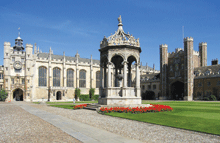Western universities have challenged the factual accuracy of claims that institutions are allowing leaders of “despotic” regimes with dubious human-rights records to buy influence through donations. A catalogue of financial donations from foreign governments to university subjects designated as “strategically important” by the UK, was published in A Degree of Influence, a recent report of the Centre for Social Cohesion (CSC).
“Universities have insufficient safeguards in place to prevent donations affecting the way universities are run. There is clear evidence that at some universities, choice of teaching materials, subject areas, the degrees offered, recruitment of staff, the composition of advisory boards and even the selection of students are now subject to influence from donors,” says the damning report, which adds that the terms of agreements with foreign donors — and in some cases even the existence of the donations — are not transparent. It states that some donations to Islamic studies centres have included clauses that allow the donor significant control.
 Citing an example, the CSC report alleges that Prince Alwaleed, a Saudi prince who made a £16 million (Rs.117 crore) grant, was allowed to appoint members of the management committees of Islamic studies centres at the universities of Cambridge and Edinburgh. “While the principal donor’s intentions seem honourable, a precedent appears to have been set where wealthy donors can influence the running of an independent academic institution,” says the report.
Citing an example, the CSC report alleges that Prince Alwaleed, a Saudi prince who made a £16 million (Rs.117 crore) grant, was allowed to appoint members of the management committees of Islamic studies centres at the universities of Cambridge and Edinburgh. “While the principal donor’s intentions seem honourable, a precedent appears to have been set where wealthy donors can influence the running of an independent academic institution,” says the report.
The report also claims that the Alwaleed Centre at the University of Cambridge has to submit two reports a year to the prince and that Cambridge can amend the regulations governing the centre only “by grace on the recommendation of the managers, subject to the approval of (the prince)”.
 At a discussion in Cambridge’s Senate House last year, Richard Bowring, a professor of Japanese studies, said the decision to give the centre independence from the usual faculties system was a reversal of policy. He said it was “depressing to see academic policy to be so openly revealed to be driven by financial considerations”.
At a discussion in Cambridge’s Senate House last year, Richard Bowring, a professor of Japanese studies, said the decision to give the centre independence from the usual faculties system was a reversal of policy. He said it was “depressing to see academic policy to be so openly revealed to be driven by financial considerations”.
Cambridge University has said that it is not accountable to the prince, and has insisted that its procedures for accepting donations are “thorough and transparent” to maintain its “independence and integrity”. Likewise the University of Edinburgh said in a statement that it “categorically denies any allegations that funders influence its research methods or outcomes or bias its teaching provision”. Edinburgh added that the CSC report appeared to have been “poorly researched” and had made “selective use of the available evidence”, offering no substantiation “of the outcome of alleged influence on the operations of these centres at the university”.
(Excerpted and adapted from Times Higher Education)